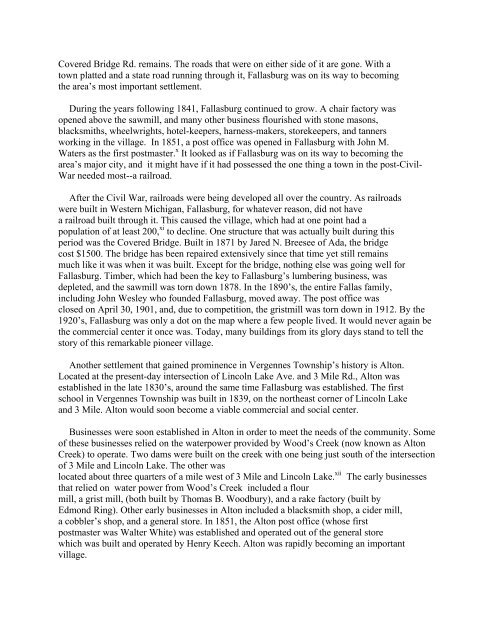The First One Hundred Years of Vergennes Township History
The First One Hundred Years of Vergennes Township History
The First One Hundred Years of Vergennes Township History
Create successful ePaper yourself
Turn your PDF publications into a flip-book with our unique Google optimized e-Paper software.
Covered Bridge Rd. remains. <strong>The</strong> roads that were on either side <strong>of</strong> it are gone. With a<br />
town platted and a state road running through it, Fallasburg was on its way to becoming<br />
the area’s most important settlement.<br />
During the years following 1841, Fallasburg continued to grow. A chair factory was<br />
opened above the sawmill, and many other business flourished with stone masons,<br />
blacksmiths, wheelwrights, hotel-keepers, harness-makers, storekeepers, and tanners<br />
working in the village. In 1851, a post <strong>of</strong>fice was opened in Fallasburg with John M.<br />
Waters as the first postmaster. x It looked as if Fallasburg was on its way to becoming the<br />
area’s major city, and it might have if it had possessed the one thing a town in the post-Civil-<br />
War needed most--a railroad.<br />
After the Civil War, railroads were being developed all over the country. As railroads<br />
were built in Western Michigan, Fallasburg, for whatever reason, did not have<br />
a railroad built through it. This caused the village, which had at one point had a<br />
population <strong>of</strong> at least 200, xi to decline. <strong>One</strong> structure that was actually built during this<br />
period was the Covered Bridge. Built in 1871 by Jared N. Breesee <strong>of</strong> Ada, the bridge<br />
cost $1500. <strong>The</strong> bridge has been repaired extensively since that time yet still remains<br />
much like it was when it was built. Except for the bridge, nothing else was going well for<br />
Fallasburg. Timber, which had been the key to Fallasburg’s lumbering business, was<br />
depleted, and the sawmill was torn down 1878. In the 1890’s, the entire Fallas family,<br />
including John Wesley who founded Fallasburg, moved away. <strong>The</strong> post <strong>of</strong>fice was<br />
closed on April 30, 1901, and, due to competition, the gristmill was torn down in 1912. By the<br />
1920’s, Fallasburg was only a dot on the map where a few people lived. It would never again be<br />
the commercial center it once was. Today, many buildings from its glory days stand to tell the<br />
story <strong>of</strong> this remarkable pioneer village.<br />
Another settlement that gained prominence in <strong>Vergennes</strong> <strong>Township</strong>’s history is Alton.<br />
Located at the present-day intersection <strong>of</strong> Lincoln Lake Ave. and 3 Mile Rd., Alton was<br />
established in the late 1830’s, around the same time Fallasburg was established. <strong>The</strong> first<br />
school in <strong>Vergennes</strong> <strong>Township</strong> was built in 1839, on the northeast corner <strong>of</strong> Lincoln Lake<br />
and 3 Mile. Alton would soon become a viable commercial and social center.<br />
Businesses were soon established in Alton in order to meet the needs <strong>of</strong> the community. Some<br />
<strong>of</strong> these businesses relied on the waterpower provided by Wood’s Creek (now known as Alton<br />
Creek) to operate. Two dams were built on the creek with one being just south <strong>of</strong> the intersection<br />
<strong>of</strong> 3 Mile and Lincoln Lake. <strong>The</strong> other was<br />
located about three quarters <strong>of</strong> a mile west <strong>of</strong> 3 Mile and Lincoln Lake. xii <strong>The</strong> early businesses<br />
that relied on water power from Wood’s Creek included a flour<br />
mill, a grist mill, (both built by Thomas B. Woodbury), and a rake factory (built by<br />
Edmond Ring). Other early businesses in Alton included a blacksmith shop, a cider mill,<br />
a cobbler’s shop, and a general store. In 1851, the Alton post <strong>of</strong>fice (whose first<br />
postmaster was Walter White) was established and operated out <strong>of</strong> the general store<br />
which was built and operated by Henry Keech. Alton was rapidly becoming an important<br />
village.




